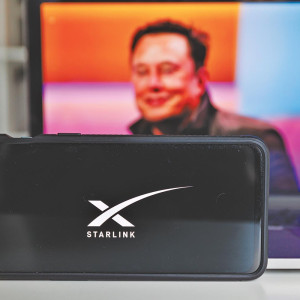Starlink representatives have approached top government officials. Telecom regulator wants a proposal to begin with.

Senior officials from Elon Musk’s SpaceX company that offers Starlink satellite services have been making rounds in Kathmandu with the goal of setting up a dedicated internet service in Nepal.
Some three weeks ago, a Starlink team visited Kathmandu and met with senior officials including Prime Minister Pushpa Kamal Dahal, according to a senior official at the Ministry for Information and Communication Technology who is familiar with the meetings.
They have reportedly discussed their proposal to provide dedicated satellite internet service in Nepal. Musk, the world’s richest person with a net worth of over $250 billion, is a business magnate and investor who owns SpaceX and the electric carmaker Tesla, among other companies.
Govinda Acharya, press adviser to the prime minister, however, said he was unaware of the meeting between Dahal and Starlink representatives. The US Embassy in Kathmandu coordinated the meeting with senior officials from the ministry and others. The embassy has been repeatedly expressing its concerns over the red tape hindering Starlink’s operation in Nepal that could deliver “cheap, reliable, affordable and high-tech” internet service via direct satellite connection.
Though the Nepal government is positive towards the proposal, there are some legal hurdles to Starlink setting up an independent company for its Nepal operations.
In the first week of March, during a virtual meeting with Nepal Telecommunication Authority chairman Purushottam Khanal, Starlink officials had expressed their desire to set up a fully Starlink-owned company in Nepal without any domestic stake.
“They were interested in coming here and we were also receptive to their proposal to offer satellite-based internet services in Nepal,” Khanal told the Post. “But they have yet to submit a proposal.”
As per Nepal’s law, any foreign firm that sets up a company here needs to have at least 20 percent local stake, which the Starlink officials did not want, according to Khanal. “They wanted their 100 percent investment but there is a legal hurdle that prevents them from working here,” Khanal said. “We need the kind of internet connections that Starlink offers. The hybrid internet connections that Nepal currently has is ill suited to our difficult geographical terrains.”
According to its website, Starlink’s high-speed, low latency service is made possible via the world’s largest constellation of highly advanced satellites operating in low orbit around the earth. The company is currently operating in as many as four dozen countries across continents.
“When I was the secretary at the Ministry of Information and Communication Technology, a team from Starlink had once met me,” Baikuntha Aryal, the incumbent chief secretary of the Nepal government, told the Post on Saturday.
The team that met Aryal was from Starlink, India. The government on June 15 appointed Aryal the chief secretary. “They wanted to open an independent company in Nepal to provide service but due to some legal issues, the proposal is still pending, I suppose,” said the chief secretary.
In their latest visit to Kathmandu, the team also met the minister for information and communication technology and other offices, said sources from various government departments.
The Post was unable to immediately contact Minister of Communication and Information Technology Rekha Sharma and spokesperson for the ministry Netra Prasad Subedi.
Khanal said he was unaware of the recent visit by Starlink officials in Kathmandu but the telecom regulator is positive about acquiring the company’s services if the government is ready to welcome it. The government has been using technologies like V-sat and hybrid broadband to connect Nepal to the worldwide web. Due to the country’s rugged hilly and mountainous terrains, these services are irregular.
From telemedicine service in the Himalayan region to providing all-weather internet coverage all over the country, the telecom authority has suggested switching to the satellite-based connection as that would be cheaper, more affordable and reliable, and wider and faster.
“As far as we know, Starlink wants full control in operation and management as any domestic stake [they believe] could create complications in the long run,” an official at the communication ministry told the Post. “They have asked us to relax the law but it needs a call from the top political level.”
Starlink’s advanced technology only requires setting up its office here, one with a small staff, and some logistical facilities. Khanal, during his virtual talks with Starlink officials, called for a proposal but the company has yet to table such proposals to the telecom authority, which recommends the government on whether to accept or reject the bid. The company can be allowed into the country only by amending the law.
“If Starlink comes up with a proposal, we will definitely recommend that they come and invest,” Khanal said. “We need reliable, affordable and low-cost internet service that reaches all of the country’s nooks and crannies.”











